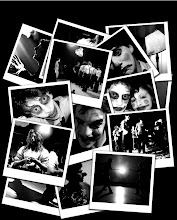
‘To Live Would Be An Awfully Big Adventure’
Jethro, for example, had played the same character in ‘The Boy James’ on and off for about a year, and on asking how this affected his ability to improvise, he gave me an illuminating response:
There are things that the audience will think are special that actually happen every night, but they feel like they’re happening for the first time. But there are other things that genuinely do happen differently, like later on in the show people come over to me and obviously that’s really touching as at the end of the play the boy is most vulnerable, so when audience members come over and return an item, or give the Boy James a cuddle, or a pat on the head - that does happen relatively often - each time it does feel very special, it’s a really meaningful thing. The show is improvised, but based on the experience of having done it dozens of times (Interview, 04/08/2011).
To put his statement in context, it is necessary to briefly outline the play Jethro is referring to. ‘The Boy James’ by Alex Wright centres on a character called The Boy (played by Jethro), who undergoes a traumatic event involving The Girl (played by Lucy), which forces him to accept his fate in becoming an adult: he must leave the ‘childlike’ desires, wishes and make-believe of youth behind. This change is further highlighted by the presence of The Adult James (played by Dan), who quietly and mysteriously rejects the Boy’s plea for him to continue on the adventures that in the play typify childhood. This interaction is most poignant when The Adult James leaves The Boy for the final time alone in his study, with just a written note that the illiterate child cannot read. The character thus makes a plea for an audience volunteer to read the letter for him. He then takes their hand and seats them at a desk in the centre of the room and asks them to begin. Each time I saw the play, not only did someone always volunteer, but also the reader was consistently visibly emotional in response to the letter’s content; in two out of six performances I witnessed, the readers cried.
Wright’s play is heavily symbolic and can thus be widely interpreted, and Jethro’s experience of playing The Boy indicates the many possible reactions audience members can have. On a practical level, the play is restricted by a number of ‘frames’: a script, a series of rehearsed movement, action and speech, which are repeated constantly for a month. Even so, ‘real’ moments of human emotion cut through what could have easily become mundane (Schechner, 1977). Immersive theatre in these instances seems characterised by relationships between audience members and actors which transcend the hyperreality of the constructed authenticity of the show. Conversely, the complete opposite could be argued. These moments of intimacy could be seen as products of total hyperreality – the audience members are so convinced by the simulated reality the ‘world’ that the play presents, that they appear to act as if Jethro is in fact a vulnerable child by comforting and touching him.
To interpret what is going on here is a complex task. One might assume audience members are indulging in a ‘willing suspension of disbelief’ (Coleridge 1818, cited in Emigh 1996), however it would seem the fullness of Jethro’s performance as the Boy, combined with the immersive ‘world’ that the set presents, induces ‘delicious instants of complete illusion’ (Stendahl 1823, cited in ibid). By inducing belief within the audience, Jethro becomes a child who has undergone a traumatic experience for the first time, who must be cared for by his ‘friends’ in the audience. In this example, for Jethro it is ‘the real’ which matters most. The most memorable audience reaction he experienced, for instance, was an elderly audience member who reassured him as she left the play with the words, ‘to live would be an awfully big adventure’, alluding to the script of Peter Pan in Barrie’s most famous work (2007 [1902]) in which Peter says, ‘to die would be an awfully big adventure’ (121, my emphasis). For Jethro, these moments were touching on a personal level, and were what made the experience varied and meaningful as opposed to simply routine. They also condensed the joy of acting in immersive theatre for Jethro, in that to live as a real character was an adventure, and what made the repetition of performances bearable.
This chapter has sought to demonstrate that ‘reality’ was a notion created in the discourse of Belt Up as an ideal to strive for in both performance and aesthetics. It was precisely because this concept was a fiction born out of discussion, however, that when it came to realising the show materially, the concept as ideal became a concept of limitation. After the final performances at the end of August, in the depth of night, I joined the team to begin deconstructing the set. Objects were variously torn, discarded, and offered up to individuals. Their meaning vanished along with the imaginary worlds that would no longer be created; this temporary home was destroyed and the space restored to its original state of disrepair.
'The Boy James' returns to London from 25 Jan - 11 Feb 2012 and at the Adeliade Fringe Festival from 24th February - 18th March 2012. Full details at www.beltuptheatre.com


what a thoughtful and interesting piece of writing this is!
ReplyDelete